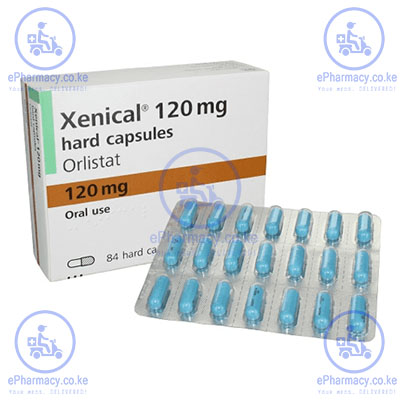Description
Orlistat/Xenical/Obestat is a gastric and pancreatic lipase inhibitor that limits the absorption of dietary fat. It is used together with dietary modification in the management of obesity, i.e. in patients with a body mass index of 30 kg/m2 or greater. It may also be used in overweight patients with a body mass index of 28 kg/m2 or more if there are associated risk factors. Treatment with orlistat in Kenya should only be started once the patient has achieved a weight loss of at least 2.5 kg over 4 consecutive weeks as a result of diet alone. Orlistat is given in a usual dose of 120 mg by mouth three times daily, immediately before, during, or up to 1 hour after meals. If a meal is missed or contains no fat, the dose should be omitted. Orlistat therapy should be stopped if the patient does not lose at least 5% of their body-weight during the first 12 weeks of therapy.
Precautions while using Orlistat
Orlistat/Xenical/Obestat should not be given to patients with chronic malabsorption syndrome or cholestasis and should be given with caution to patients in Kenya with a history of hyperoxaluria or calcium oxalate nephrolithiasis. Adjustments to dosage of hypoglycaemics may be necessary in patients with type II diabetes because of improved metabolic control following weight loss in these patients. Supplements of fat-soluble vitamins may be necessary during long-term therapy, but they should be taken at least 2 hours before or after an orlistat dose or at bedtime.
Interactions of Obestat with other Drugs
Orlistat may reduce the absorption of fat-soluble vitamins including but not limited to Omega 3 and Cod Liver Oil. The manufacturer recommends that it not be taken with acarbose. In patients receiving warfarin, international normalised ratio should be monitored during treatment with orlistat. A reduction in ciclosporin concentrations to subtherapeutic levels has been reported in transplant recipients given orlistat
Adverse Effects of using Xenical tabs
Gastrointestinal disturbances, including faecal urgency and incontinence, flatulence, and fatty stools or discharge, are the most frequently reported adverse effects during treatment with orlistat. They may be minimised by limiting the amount of fat in the diet. Other reported effects have included headache, anxiety, fatigue, and menstrual irregularities. There have been concerns about an increased risk of breast cancer in patients taking orlistat but the manufacturers consider that there is no evidence of a causal link.






Reviews
There are no reviews yet.